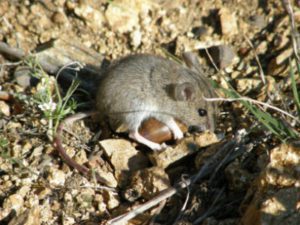It’s never been this bad before
By Zachary Ciras on February 3, 2022.
We have been hearing it all mouse season. “It’s never been this bad before,” or some variation of that. Folks who were used to managing one or two mice caught on traps in the fall are now inundated. Homeowners who never saw mouse activity in their house feel like they’re fighting a never ending battle. What could be a cause for all of this vermin vexation?
Mast years for oak trees

Blooming Oak tree with young leaves and catkins.
Somewhat sporadically , but occurring every one to five years on average, oak trees go through a Mast year. This is a season which produces an abundance of acorns which fall when autumn comes to pass. Some of the bounty of 2021’s mast year may have to do with a combination of a relatively mild winter and a plentitude of summer rain. The mild winters allow for the development of oak flower clusters known as catkins. Assuming no late frost, these catkins will develop as many acorns as nurture allows.
The rain we had this summer provided an ample supply of water for the growing plants and seeds. Dropped acorns provide the start for new trees the following year, but also feed a large (and growing) number of critters. Folklore forecasts a harsh winter when acorns drop in great multitudes.
Excess food supply delivers more, healthier rodents
A glut in the food supply for rodents, whether in the form of acorns or in any other number of plants, seeds, nuts, or even insects who feed on these as well, will inevitably deliver a robust population in rats, mice, and other rodents. This is exactly what we have seen in New England. One corpulent squirrel in Maine has even made it to headline news. Fatty McFatterson isn’t the only rodent top of mind. Massachusetts and New Hampshire residents have been reported a higher number of mice and a stealthier breed likewise. Norway rats have been seen freely exploring neighborhoods where they’ve never been seen before. These pests have also been stockpiling the copious food supply inside homes, making it more difficult to control them with conventional rodent baits and food lure traps.

Mouse eating an acorn
At Colonial Pest, we have been studying the most difficult cases of rats and mice inside New England homes for years. While many are experiencing the resulting phenomena for the first time, where mice and rats are non-compliant with traditional control efforts, we have exhaustively trained and practiced in exclusion, elimination, and education to successfully rid unwelcome rodents from your home.